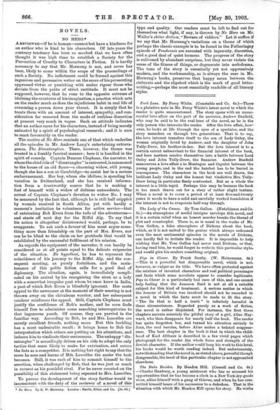NOVELS'.
NO HERO.*
A mu:WEB—if he is human--cannot but have a kindness for an author who is kind to his characters. Of late years the contrary tendency has been so marked that we have often thought it was high time to establish a Society for the Prevention of Cruelty to Characters in Fiction. It is hardly necessary to say that Mr. Hornung is not, and never has been, likely to come within the scope of the proceedings of such a Society. No indictment could be framed against this ingenious and persuasive writer on the score of his persecuting oppressed virtue or punishing with undue rigour those who deviate from the paths of strict rectitude. It must not be supposed, however, that he runs to the opposite extreme of idolising the creatures of his imagination, a practice which acts on the reader much as does the injudicious habit in real life of cramming a person down your throat. It is simply that he treats them with an amount of interest, sympathy, and con- sideration far removed from the mode of ruthless dissection at present very much in vogue. Such an attitude indicates that an author cares for his characters, instead of being merely animated by a spirit of psychological research; and it is sure to react favourably on the reader.
The motive of No Hero reminds one of that which underlies all the episodes in Mr. Andrew Lang's entertaining extrava- ganza, The Disentanglera. There, however, the theme was treated in a frankly farcical manner; here it is handled in the spirit of comedy. Captain Duncan Clephane, the narrator, to whom the chief role of " disentangler " is entrusted, is summoned to the house of an old flame—a charming widow, still young, though she has a son at Cambridge—to assist her in a serious embarrassment. Her boy, whom she idolises, is spending his vacation in Switzerland, and she has received informa- tion from a trustworthy source that he is making a fool of himself with a widow of dubious antecedents. The extent of Captain Clephane's devotion to widow No. 1 may be measured by the fact that, although he is still half crippled by wounds received in South Africa, yet with hardly a moment's hesitation he volunteers for active service—that of extricating Bob Evers from the toils of the adventuress— and starts off next day for the Riffel Alp. To say that his action is altogether disinterested would, perhaps, be to exaggerate. To ask such a favour 'of him must argue some- thing more than friendship on the part of Mrs. Evers, nor can he be blind to the claim on her gratitude that would be established by the successful fulfilment of his mission.
As regards the equipment of the narrator, it can hardly be considered as at all points equal to the delicate exigencies of the situation. Ex hypothesi, he has to represent the coincidence of his journey to the Riffel Alp, and the con- sequent meeting, as purely fortuitous, and the main- tenance of this polite fiction calls for a good deal of diplomacy. The situation, again, is immediately compli- cated on his arrival by his recognising the siren as a lady with a somewhat irregular past whom he 'once knew in India, a past of which Bob Evers is blissfully ignorant. Her mute appeal to the newcomer at the moment of their meeting is not thrown away on the chivalrons warrior, and her subsequent candour reinforces the appeal. Still, Captain Clephane must justify the confidence of Bob's mother, and he soon finds himself free to administer some searching interrogatories to that ingenuous youth. Of course, they are parried in the familiar way. According to Bob, he and Mrs. Lascelles are merely excellent friends, nothing more. But this heckling has a most undesirable result: it brings home to Bob the interpretation which others are putting on his attentions, and induces him to vindicate their seriousness. The unhappy " dis- entangler " is accordingly driven on his side to adopt the only tactics that seem likely to make for extrication, and enters the lists as a competitor. It is nothing but right to say that the more he sees and learns of MI's. Lascelles the easier the task becomes. Still, it was rash of him to commit himself to the assertion, when challenged by Bob, that he was just as much in earnest as his youthful rival. For he never counted on the possibility of this statement being repeated to Mrs. Lascelles.
Ta pursue the development of the story further would be inconsistent with the duty of the reviewer of a novel of this • No Nero. By E. W. Hornung. London : Smith, Elder, and Co. [3e. 65.] type and quality. Our readers must be left to find out for themselves what light, if any, is thrown by No Hero on Mr. Weller's obiter dictum," Beware of vidders." Let it suffice if we say that Mr. Hornung's variations, on a theme of which perhaps the classic example is to be found in the Fotheringay episode of Pendennis are executed with ingenuity, discretion, and a good deal of quiet humour. The progress of the story is enlivened by abundant surprises, but they never violate the sense of the fitness of things, or degenerate into melodrama. The tone of the story is essentially yet not oppressively modern, and the workmanship, as is always the case in Mr. Hornung's books, preserves that happy mean between the elaborate and the slipshod which is the mark of good letter- writing,—perhaps the most essentially readable of all literary styles.






































 Previous page
Previous page